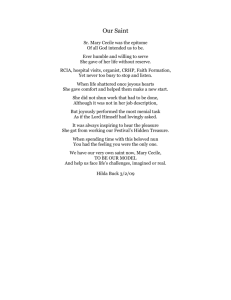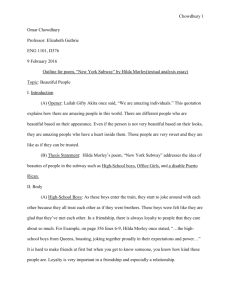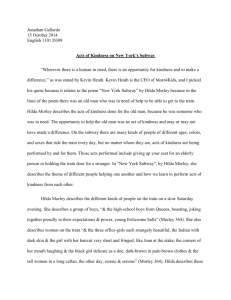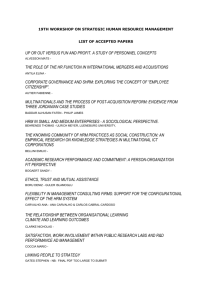Celtic Christianity - St. Luke`s Episcopal Church
advertisement
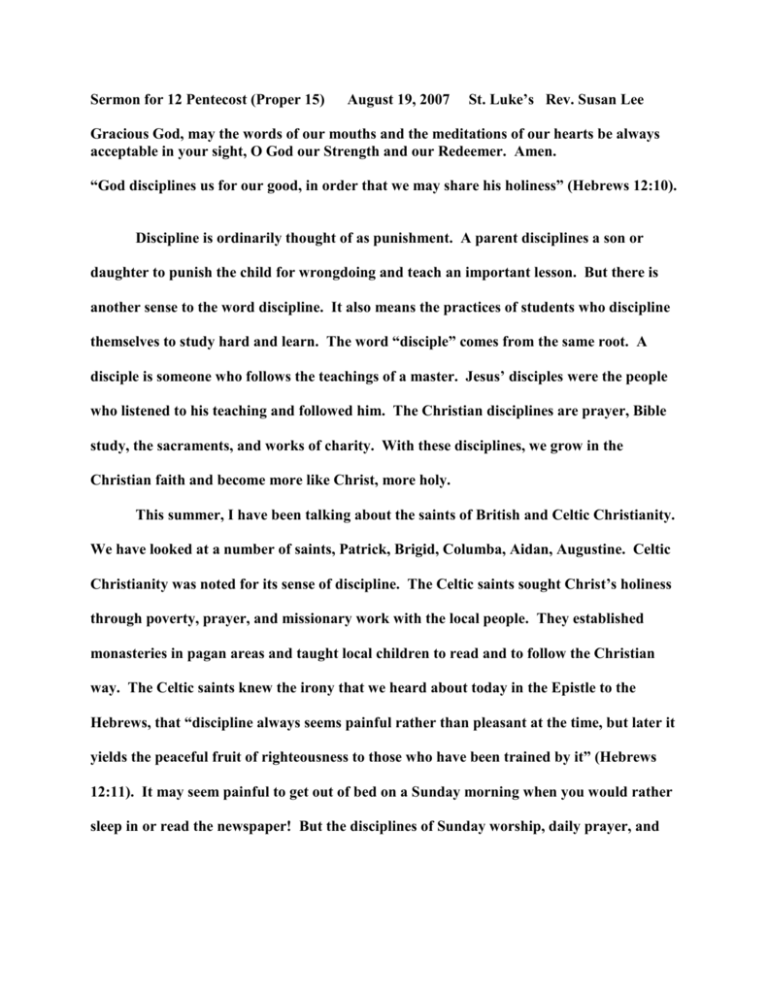
Sermon for 12 Pentecost (Proper 15) August 19, 2007 St. Luke’s Rev. Susan Lee Gracious God, may the words of our mouths and the meditations of our hearts be always acceptable in your sight, O God our Strength and our Redeemer. Amen. “God disciplines us for our good, in order that we may share his holiness” (Hebrews 12:10). Discipline is ordinarily thought of as punishment. A parent disciplines a son or daughter to punish the child for wrongdoing and teach an important lesson. But there is another sense to the word discipline. It also means the practices of students who discipline themselves to study hard and learn. The word “disciple” comes from the same root. A disciple is someone who follows the teachings of a master. Jesus’ disciples were the people who listened to his teaching and followed him. The Christian disciplines are prayer, Bible study, the sacraments, and works of charity. With these disciplines, we grow in the Christian faith and become more like Christ, more holy. This summer, I have been talking about the saints of British and Celtic Christianity. We have looked at a number of saints, Patrick, Brigid, Columba, Aidan, Augustine. Celtic Christianity was noted for its sense of discipline. The Celtic saints sought Christ’s holiness through poverty, prayer, and missionary work with the local people. They established monasteries in pagan areas and taught local children to read and to follow the Christian way. The Celtic saints knew the irony that we heard about today in the Epistle to the Hebrews, that “discipline always seems painful rather than pleasant at the time, but later it yields the peaceful fruit of righteousness to those who have been trained by it” (Hebrews 12:11). It may seem painful to get out of bed on a Sunday morning when you would rather sleep in or read the newspaper! But the disciplines of Sunday worship, daily prayer, and works of charity train us in holiness. We gain the self-discipline to serve Christ and to be people of peace and justice. The Celtic saints are great role-models in this endeavor. Today I would like to talk about another Celtic saint, St. Hilda of Whitby. Hilda was a disciple of St. Aidan, the apostle to Northumbria in northern England in the early 7th century. Hilda was a member of one of the royal families of Northumbria. She was born in 614, just before her father was poisoned in a court intrigue. Hilda and her sister and mother went to live with her father’s uncle, King Edwin of Northumbria, and she grew up in the royal court. King Edwin’s wife was a Christian and had a chaplain, Bishop Paulinus, who had come to Britain with St. Augustine. When Hilda was 13, King Edwin was baptized by Bishop Paulinus. Hilda also was baptized, along with the rest of her family. When Hilda was 33, she decided to become a nun and made preparations to join her older sister in a convent in France. But St. Aidan, the Bishop of Northumbria, didn’t want to lose her to France. The Celtic tradition was to work with the ruling families to win over the population, and so Aidan asked Hilda to stay in Britain and lead a small convent in his area. Hilda learned about the Celtic traditions from St. Aidan. She learned about the importance of humility and simplicity in religious life, and about the Celtic vision of God revealed through nature. The Celtic church encouraged female leadership, and soon Aidan asked Hilda to take charge of a large monastery that had been led by the first nun he had ordained. It was a double monastery called Hartlepool, and Hilda became its abbess. The monastery included both monks and nuns, on separate sides of the monastery. Everyone worshipped together at the daily chapel services. Hilda quickly gained a reputation for intelligent and wise leadership. Together with her membership in the royal family, she was an important leader in the Celtic church of Northumbria. Her good reputation led to a dramatic turn in her life. Her relative King Oswiu won an important battle and became the ruler of most of England. Before the battle, the King had vowed that if he was victorious, he would consecrate his baby daughter to the monastic life and would give land for 12 new monasteries throughout his expanded kingdom. When he won the battle, the King kept his promises. He sent his small daughter to Hilda to be educated and raised in the monastic life. He also gave a large tract of land to Hilda on which to create a new monastery. There Hilda established a new double monastery, for both men and women, which became known as Whitby. So Hilda is known as St. Hilda of Whitby. Hilda built up her new monastery into a center of learning by acquiring a large number of books. In those days, long before the printing press, all books were copied by hand by monks and nuns. So they were very expensive and valuable. Hilda built up a large library that attracted many people who wanted to become ordained as monks, nuns, and priests. Children were also educated there in the traditions begun by St. Aidan. They learned to read Latin and absorbed the knowledge accumulated in the many books of the monastery library. In addition to educating people, Hilda maintained strict monastic standards at Whitby. All goods and property were held in common, all residents of the monastery studied the Scriptures and prayed together, and peace and charity for all was the standard. Hilda gained such a reputation that kings and bishops traveled to Whitby to consult with her. The Venerable Bede, the historian of the early English church notes of Hilda that "All who knew her called her mother because of her outstanding devotion and grace". Her monastery was so successful that eventually five of her monks were ordained bishop. Hilda also was instrumental in nurturing the first English poet. One day she heard a shepherd singing verses he had composed in Anglo-Saxon, the local language which eventually became English. His name was Caedmon. Hilda was impressed with his ability to compose poetry, and she invited him to take up residence in her monastery. That meant that he could leave his occupation of herding and spend more time composing verse and song. Caedmon took the religious ideas of the Bible and Christian tradition and set them to music in verse – that is, he composed hymns in English. They became an evangelical tool as Hilda and her monks and nuns taught the local population about Christianity. So Hilda’s motherly concern for the development of Caedmon’s abilities also had a missionary purpose – a way to spread Christian ideas in an attractive and easy way. Hilda’s life illustrates the egalitarianism of Celtic Christianity. Being female was not a bar to church leadership in the Celtic monasteries. Talent was recognized and encouraged wherever it was found. As education for women became common in the 19th century, interest in Hilda increased because of her reputation as an educated woman and a teacher. Many schools and colleges in the English-speaking world are named for Hilda. She is typically represented in icons and statues as a nun with a crozier or shepherd’s crook. Usually, only bishops carry crosiers. But the abbots and abbesses of Celtic monasteries also carried them as a symbol of their authority. The image of Hilda with her shepherd’s crook represents this ancient tradition of female authority. Today, with women in our church gaining positions of authority once again, Hilda’s story has gained new prominence. Women in religious authority is not a new idea in our church, something that happened only with the ordination of women in the 1970s. There is also this ancient tradition in the Celtic church in which women held positions of prominence and influence. Hilda bridged the Roman and Celtic traditions in England. She was baptized by Bishop Paulinus from the Roman tradition, and was an abbess under St. Aidan in the Celtic tradition. These two ways of being Christian clashed at an important church meeting called a synod, which was held at Hilda’s monastery in Whitby. In my next sermon on the British saints, I will talk about the clash between the two traditions and their resolution under Hilda’s leadership. Let me end with a verse about Hilda, sung today by nuns at the convent in Whitby: “Peace was the rock on which she built for rich and poor an equal place, here all who came to learn to pray might grow in wisdom by God's grace.” - - Khmer - - Let us pray. Gracious God, in ancient times you called your servant Hilda to lead your church with holiness and good judgment: Grant us the grace to hear your call to Christian discipline and walk in the way of wisdom and holy service. In Jesus’ Name we pray. Amen.


